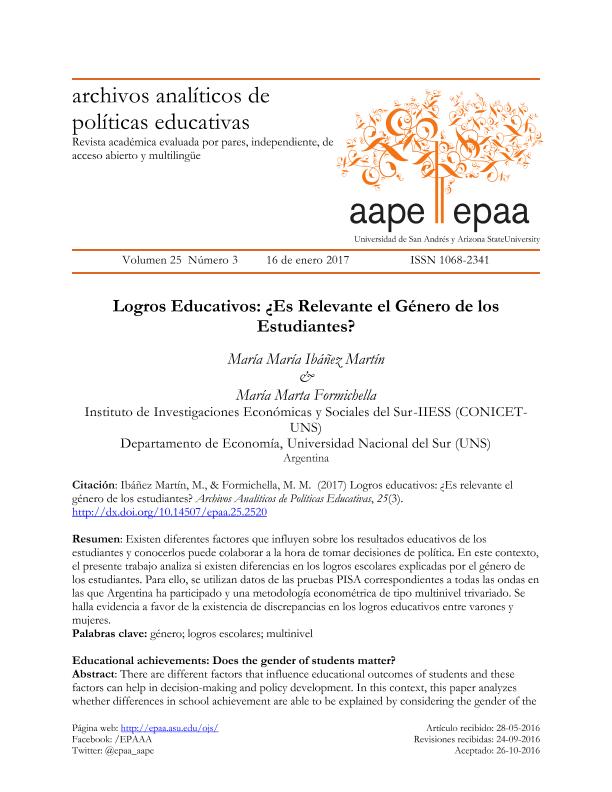Mostrar el registro sencillo del ítem
dc.contributor.author
Ibañez Martín, María María

dc.contributor.author
Formichella, Maria Marta

dc.date.available
2018-08-14T21:35:52Z
dc.date.issued
2017-01
dc.identifier.citation
Ibañez Martín, María María; Formichella, Maria Marta; Logros educativos: ¿es relevante el género de los estudiantes?; Arizona State University; Education Policy Analysis Archives; 25; 3; 1-2017; 1-32
dc.identifier.issn
1068-2341
dc.identifier.uri
http://hdl.handle.net/11336/55523
dc.description.abstract
There are different factors that influence educational outcomes of students and these factors can help in decision-making and policy development. In this context, this paper analyzes whether differences in school achievement are able to be explained by considering the gender of the students. For this purpose, PISA data bases corresponding to all waves in which Argentina has participated and a multilevel trivariate econometric methodology were used, suggesting evidence for the existence of differences in educational attainment between men and women.
dc.description.abstract
There are different factors that influence educational outcomes of students and these factors can help in decision-making and policy development. In this context, this paper analyzes whether differences in school achievement are able to be explained by considering the gender of the students. For this purpose, PISA data bases corresponding to all waves in which Argentina has participated and a multilevel trivariate econometric methodology were used, suggesting evidence for the existence of differences in educational attainment between men and women.
dc.description.abstract
Existem diversos fatores que influenciam os resultados escolares dos alunos. Conhecer-les pode ajudar na tomada de decisões políticas. Neste contexto, o presente trabalhoanalisa si existem diferenças no desempenho escolar explicado pelo gênero dos alunos. Para fazerisso, são utilizados os dados do teste PISA das ondas em que a Argentina tem participado. A metodologia econométrica empregada é trivariado multinível. Háevidências para a existência de diferenças no nível de escolaridade entre homens e mulheres.
dc.format
application/pdf
dc.language.iso
spa
dc.publisher
Arizona State University
dc.rights
info:eu-repo/semantics/openAccess
dc.rights.uri
https://creativecommons.org/licenses/by-nc-sa/2.5/ar/
dc.subject
Gender
dc.subject
Multilevel
dc.subject
School Achievement
dc.subject.classification
Economía, Econometría

dc.subject.classification
Economía y Negocios

dc.subject.classification
CIENCIAS SOCIALES

dc.title
Logros educativos: ¿es relevante el género de los estudiantes?
dc.title
Educational achievements: Does the gender of students matter?
dc.title
O nível de instrução: Gênero é estudante relevante?
dc.type
info:eu-repo/semantics/article
dc.type
info:ar-repo/semantics/artículo
dc.type
info:eu-repo/semantics/publishedVersion
dc.date.updated
2018-06-28T17:56:28Z
dc.journal.volume
25
dc.journal.number
3
dc.journal.pagination
1-32
dc.journal.pais
Estados Unidos

dc.journal.ciudad
Arizona
dc.description.fil
Fil: Ibañez Martín, María María. Consejo Nacional de Investigaciones Científicas y Técnicas. Centro Científico Tecnológico Conicet - Bahía Blanca. Instituto de Investigaciones Económicas y Sociales del Sur. Universidad Nacional del Sur. Departamento de Economía. Instituto de Investigaciones Económicas y Sociales del Sur; Argentina
dc.description.fil
Fil: Formichella, Maria Marta. Consejo Nacional de Investigaciones Científicas y Técnicas. Centro Científico Tecnológico Conicet - Bahía Blanca. Instituto de Investigaciones Económicas y Sociales del Sur. Universidad Nacional del Sur. Departamento de Economía. Instituto de Investigaciones Económicas y Sociales del Sur; Argentina
dc.journal.title
Education Policy Analysis Archives
dc.relation.alternativeid
info:eu-repo/semantics/altIdentifier/url/https://epaa.asu.edu/ojs/article/view/2520
dc.relation.alternativeid
info:eu-repo/semantics/altIdentifier/doi/http://dx.doi.org/10.14507/epaa.25.2520
Archivos asociados
